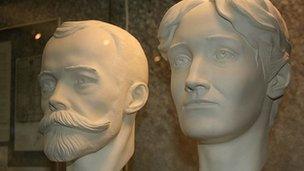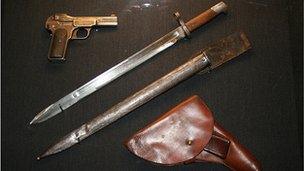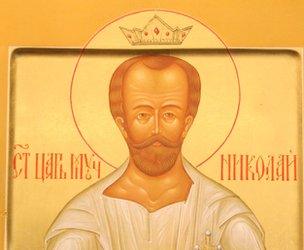Tsar Nicholas - exhibits from an execution
- Published

Busts of the late Tsar Nicholas II and his wife Alexandra are on display
For the first time, Russians have the chance to examine the evidence surrounding the execution of Tsar Nicholas II and his family following the Russian Revolution almost 100 years ago.
An exhibition on their detention, killings and the subsequent investigations into them has opened at the Russian State Archives in Moscow.
It comes as Russians continue to reassess the reputation of their last tsar.
He and his family and four members of staff were killed without trial by Bolsheviks in the early hours of 17 July 1918, in the cellar of a house in the Urals city of Yekaterinburg.
The Soviet authorities drew a veil over what had happened.
The exhibition's curator, Marina Siderova, says Russians now want to know more about the subject.
'Great interest'
"No one was talking about this before," she says.

Yakov Yurovsky's weapons are on display
"In Soviet times it was taboo, a closed subject and probably now we are only just starting to talk about this tragedy.
"The number of people visiting the exhibition shows there is great interest in this topic."
Visitors can see material gathered by investigators shortly after the killings and in post-Soviet times, as well as objects and clothing that belonged to the family.
Tsar Nicholas II's hand-written letter of abdication is on display next to his personal diary.
The Mauser pistol and a long knife belonging to the head of the execution squad, Yakov Yurovsky, can be seen.
Some of the bullets used in the killings are on show, alongside photos and diagrams of where the Romanovs and their executioners were positioned.
An unfinished embroidery by Nicholas's wife, Alexandra, is displayed, as well as uniforms worn by the tsar and his heir, Alexei, while photographs show the family doing mundane tasks, such as gardening, during their detention by the Bolsheviks.
The remains of Nicholas, Alexandra and three of their five children were found in 1991 after the collapse of the Soviet Union.
The bodies of Alexei and the fourth daughter were not found until 2007, fuelling rumours in the meantime that they had survived.
As part of the official identification process DNA tests were carried out and lifelike models of their heads, based on the remains found in 1991, were made and are on display.
'In perspective'
A 16-year-old visitor, Alexandra, said she had not learnt enough about the period at school. "I think this is a very interesting topic and every Russian person should know their history and that's why I'm here."

Nicholas, who abdicated more than a year before his death, was made a saint in 2000
Her friend Vladimir, 18, added: "I'm interested in why the emperor's family were killed. I think it was unfair. I'm interested in how it happened and why people did it."
In Soviet times Nicholas was portrayed as a weak and incompetent leader, whose decisions had led to military defeats and the deaths of millions of his subjects.
In 1998, the then president, Boris Yeltsin, attended the reburial in St Petersburg of the remains found in 1991 and described the killings as one of the most shameful pages in Russian history.
Despite doubts among some members of the Russian Orthodox Church that the remains of Nicholas and his family have ever been found, it bestowed sainthood on the Romanovs in 2000.
Anglo-Russian historian Nikolai Tolstoy, who is also chancellor of the International Monarchist League, sees the exhibition as part of the reassessment of the tsar's reign.
"There were many bad things about the tsar's regime, but he inherited an autocracy and his acts are now being seen in perspective and in comparison to the terrible crimes committed by the Soviets," he says.
"His regime had the possibility for reform."
There are, he adds, growing numbers of books on the tsarist era, while imperial icons are increasingly seen in Russian churches.
Pro-monarchist groups have taken part in the recent wave of anti-Putin protests in Russia and Mr Tolstoy says they see the restoration of the monarchy as a way of reining in an "increasingly autocratic" president.
"They want a constitutional monarchy, which would help diffuse power at the top," he says.
In 2008 Russia's Supreme Court ruled that Nicholas and his family were the victims of political repression and should be rehabilitated. Now Russians have a chance to make up their own minds.